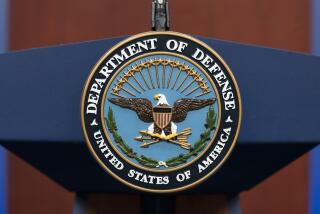Waging war, legally
- Share via
‘AMERICA IS A NATION OF LAW,” President Bush observed Wednesday when he announced that 14 accused terrorists held in secret CIA prisons abroad had been transferred to the U.S. detention center at Guantanamo Bay, Cuba, where they will receive the protections of international law. Later in the day, Bush
submitted to Congress an overdue (though still flawed) proposal to create military commissions to try these and other detainees.
Critics will complain that Bush’s concern for the rule of law comes rather late in this war on terrorism. He is asking Congress to approve military commissions only because the Supreme Court ruled earlier this year that he had violated the Constitution and Common Article 3 of the Geneva Convention when he impaneled military tribunals of his own devising.
As for the 14 prisoners, at this late date they are unlikely to possess any information about current conspiracies. Normalizing their status (if detention at Guantanamo can be called normal) defuses a controversy with U.S. allies over the CIA’s detention of suspected terrorists abroad.
That said, Bush’s actions reflect a welcome recognition that the war on terrorism doesn’t mean the president can ignore either the Constitution or the international rules of war. Coincidentally or not, his remarks came on the day that the Pentagon released a new Army field manual making it clear that interrogators may not engage in “cruel, inhumane or degrading” punishment. At a time when some Republican candidates for Congress are championing Bush’s leadership in the war, the president seems to be acknowledging some past missteps.
On the theory that 9/11 “changed everything,” the administration has over the last five years toyed with redefining torture, ignored the expertise of career military lawyers and essentially told the other two branches of the federal government that they were bystanders in this war. It was a humbler Bush who “respectfully” asked Congress to enact his proposals for military commissions to try detainees at Guantanamo, including the relocated CIA prisoners. Bush must know that he has to be prepared to compromise with members of Congress with other ideas.
That would include senior Republicans such as Sen. John McCain of Arizona, who argues that detainees at Guantanamo should enjoy the protections afforded to defendants by the Uniform Code of Military Justice, including the right to see all evidence against them and protection against testimony obtained through coercive questioning. Bush’s proposal does not give detainees such protections. For example, a military judge could admit evidence obtained through coercion if it were “reliable and probative.”
As was not the case when he asserted the authority to create military tribunals on his own, Bush must now find common ground with Congress. That’s the American way. In what Bush rightly called “a nation of law,” the president proposes and the Congress disposes -- even in the post-9/11 world.
More to Read
Sign up for Essential California
The most important California stories and recommendations in your inbox every morning.
You may occasionally receive promotional content from the Los Angeles Times.













